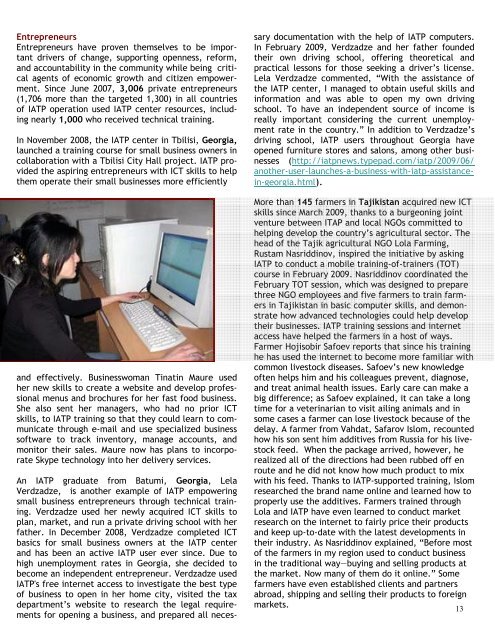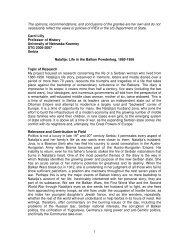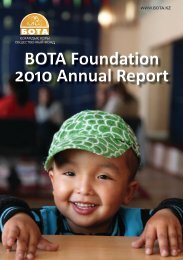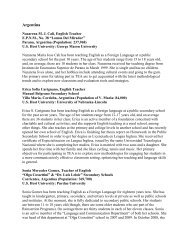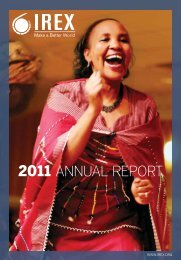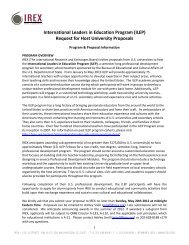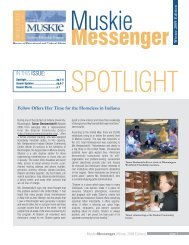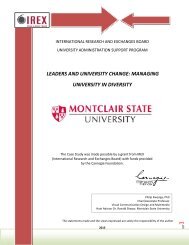IATP Monitoring and Evaluation Report - IREX
IATP Monitoring and Evaluation Report - IREX
IATP Monitoring and Evaluation Report - IREX
Create successful ePaper yourself
Turn your PDF publications into a flip-book with our unique Google optimized e-Paper software.
Entrepreneurs<br />
Entrepreneurs have proven themselves to be important<br />
drivers of change, supporting openness, reform,<br />
<strong>and</strong> accountability in the community while being critical<br />
agents of economic growth <strong>and</strong> citizen empowerment.<br />
Since June 2007, 3,006 private entrepreneurs<br />
(1,706 more than the targeted 1,300) in all countries<br />
of <strong>IATP</strong> operation used <strong>IATP</strong> center resources, including<br />
nearly 1,000 who received technical training.<br />
In November 2008, the <strong>IATP</strong> center in Tbilisi, Georgia,<br />
launched a training course for small business owners in<br />
collaboration with a Tbilisi City Hall project. <strong>IATP</strong> provided<br />
the aspiring entrepreneurs with ICT skills to help<br />
them operate their small businesses more efficiently<br />
<strong>and</strong> effectively. Businesswoman Tinatin Maure used<br />
her new skills to create a website <strong>and</strong> develop professional<br />
menus <strong>and</strong> brochures for her fast food business.<br />
She also sent her managers, who had no prior ICT<br />
skills, to <strong>IATP</strong> training so that they could learn to communicate<br />
through e-mail <strong>and</strong> use specialized business<br />
software to track inventory, manage accounts, <strong>and</strong><br />
monitor their sales. Maure now has plans to incorporate<br />
Skype technology into her delivery services.<br />
An <strong>IATP</strong> graduate from Batumi, Georgia, Lela<br />
Verdzadze, is another example of <strong>IATP</strong> empowering<br />
small business entrepreneurs through technical training.<br />
Verdzadze used her newly acquired ICT skills to<br />
plan, market, <strong>and</strong> run a private driving school with her<br />
father. In December 2008, Verdzadze completed ICT<br />
basics for small business owners at the <strong>IATP</strong> center<br />
<strong>and</strong> has been an active <strong>IATP</strong> user ever since. Due to<br />
high unemployment rates in Georgia, she decided to<br />
become an independent entrepreneur. Verdzadze used<br />
<strong>IATP</strong>'s free internet access to investigate the best type<br />
of business to open in her home city, visited the tax<br />
department’s website to research the legal requirements<br />
for opening a business, <strong>and</strong> prepared all necessary<br />
documentation with the help of <strong>IATP</strong> computers.<br />
In February 2009, Verdzadze <strong>and</strong> her father founded<br />
their own driving school, offering theoretical <strong>and</strong><br />
practical lessons for those seeking a driver’s license.<br />
Lela Verdzadze commented, “With the assistance of<br />
the <strong>IATP</strong> center, I managed to obtain useful skills <strong>and</strong><br />
information <strong>and</strong> was able to open my own driving<br />
school. To have an independent source of income is<br />
really important considering the current unemployment<br />
rate in the country.” In addition to Verdzadze’s<br />
driving school, <strong>IATP</strong> users throughout Georgia have<br />
opened furniture stores <strong>and</strong> salons, among other businesses<br />
(http://iatpnews.typepad.com/iatp/2009/06/<br />
another-user-launches-a-business-with-iatp-assistancein-georgia.html).<br />
More than 145 farmers in Tajikistan acquired new ICT<br />
skills since March 2009, thanks to a burgeoning joint<br />
venture between ITAP <strong>and</strong> local NGOs committed to<br />
helping develop the country’s agricultural sector. The<br />
head of the Tajik agricultural NGO Lola Farming,<br />
Rustam Nasriddinov, inspired the initiative by asking<br />
<strong>IATP</strong> to conduct a mobile training-of-trainers (TOT)<br />
course in February 2009. Nasriddinov coordinated the<br />
February TOT session, which was designed to prepare<br />
three NGO employees <strong>and</strong> five farmers to train farmers<br />
in Tajikistan in basic computer skills, <strong>and</strong> demonstrate<br />
how advanced technologies could help develop<br />
their businesses. <strong>IATP</strong> training sessions <strong>and</strong> internet<br />
access have helped the farmers in a host of ways.<br />
Farmer Hojisobir Safoev reports that since his training<br />
he has used the internet to become more familiar with<br />
common livestock diseases. Safoev’s new knowledge<br />
often helps him <strong>and</strong> his colleagues prevent, diagnose,<br />
<strong>and</strong> treat animal health issues. Early care can make a<br />
big difference; as Safoev explained, it can take a long<br />
time for a veterinarian to visit ailing animals <strong>and</strong> in<br />
some cases a farmer can lose livestock because of the<br />
delay. A farmer from Vahdat, Safarov Islom, recounted<br />
how his son sent him additives from Russia for his livestock<br />
feed. When the package arrived, however, he<br />
realized all of the directions had been rubbed off en<br />
route <strong>and</strong> he did not know how much product to mix<br />
with his feed. Thanks to <strong>IATP</strong>-supported training, Islom<br />
researched the br<strong>and</strong> name online <strong>and</strong> learned how to<br />
properly use the additives. Farmers trained through<br />
Lola <strong>and</strong> <strong>IATP</strong> have even learned to conduct market<br />
research on the internet to fairly price their products<br />
<strong>and</strong> keep up-to-date with the latest developments in<br />
their industry. As Nasriddinov explained, “Before most<br />
of the farmers in my region used to conduct business<br />
in the traditional way—buying <strong>and</strong> selling products at<br />
the market. Now many of them do it online.” Some<br />
farmers have even established clients <strong>and</strong> partners<br />
abroad, shipping <strong>and</strong> selling their products to foreign<br />
markets.<br />
13


